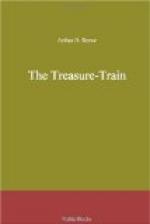“Yes. You know when Mr. Mansfield’s stomach went back on him last year it was Doctor Murray who really cured him.”
Kennedy nodded.
“Might this present trouble be a recurrence of the old trouble?”
She shook her head. “No; this is entirely different. Oh, I wish that you could go with me and see him!” she pleaded.
“I will,” agreed Kennedy.
A moment later we were speeding in a taxicab over to the apartment.
“Really,” she remarked, nervously, “I feel lost with Mr. Mansfield so ill. He has so many interests downtown that require constant attention that just the loss of time means a great deal. Of course, I understand many of them—but, you know, a private secretary can’t conduct a man’s business. And just now, when I came up from the office, I couldn’t believe that he was too ill to care about things until I actually saw him.”
We entered the apartment. A mere glance about showed that; even though Mansfield’s hobby was diamonds, he was no mean collector of other articles of beauty. In the big living-room, which was almost like a studio, we met a tall, spare, polished-mannered man, whom I quickly recognized as Doctor Murray.
“Is he any better?” blurted out Miss Grey, even before our introductions were over. Doctor Murray shook his head gravely.
“About the same,” he answered, though one could find little reassurance in his tone.
“I should like to see him,” hinted Kennedy, “unless there is some real reason why I should not.”
“No,” replied the doctor, absently; “on the contrary, it might perhaps rouse him.”
He led the way down the hall, and Kennedy and I followed, while Miss Grey attempted to busy herself over some affairs at a huge mahogany table in the library just off the living-room.
Mansfield had shown the same love of luxury and the bizarre even in the furnishing of his bedroom, which was a black-and-white room with furniture of Chinese lacquer and teakwood.
Kennedy looked at the veteran plunger long and thoughtfully as he lay stretched out, listless, on the handsome bed. Mansfield seemed completely indifferent to our presence. There was something uncanny about him. Already his face was shrunken, his skin dark, and his eyes were hollow.
“What do you suppose it is?” asked Kennedy, bending over him, and then rising and averting his head so that Mansfield could not hear, even if his vagrant faculties should be attracted. “His pulse is terribly weak and his heart scarcely makes a sound.”
Doctor Murray’s face knit in deep lines.
“I’m afraid,” he said, in a low tone, “that I will have to admit not having been able to diagnose the trouble, I was just considering whom I might call in.”
“What have you done?” asked Kennedy, as the two moved a little farther out of ear-shot of the patient.




